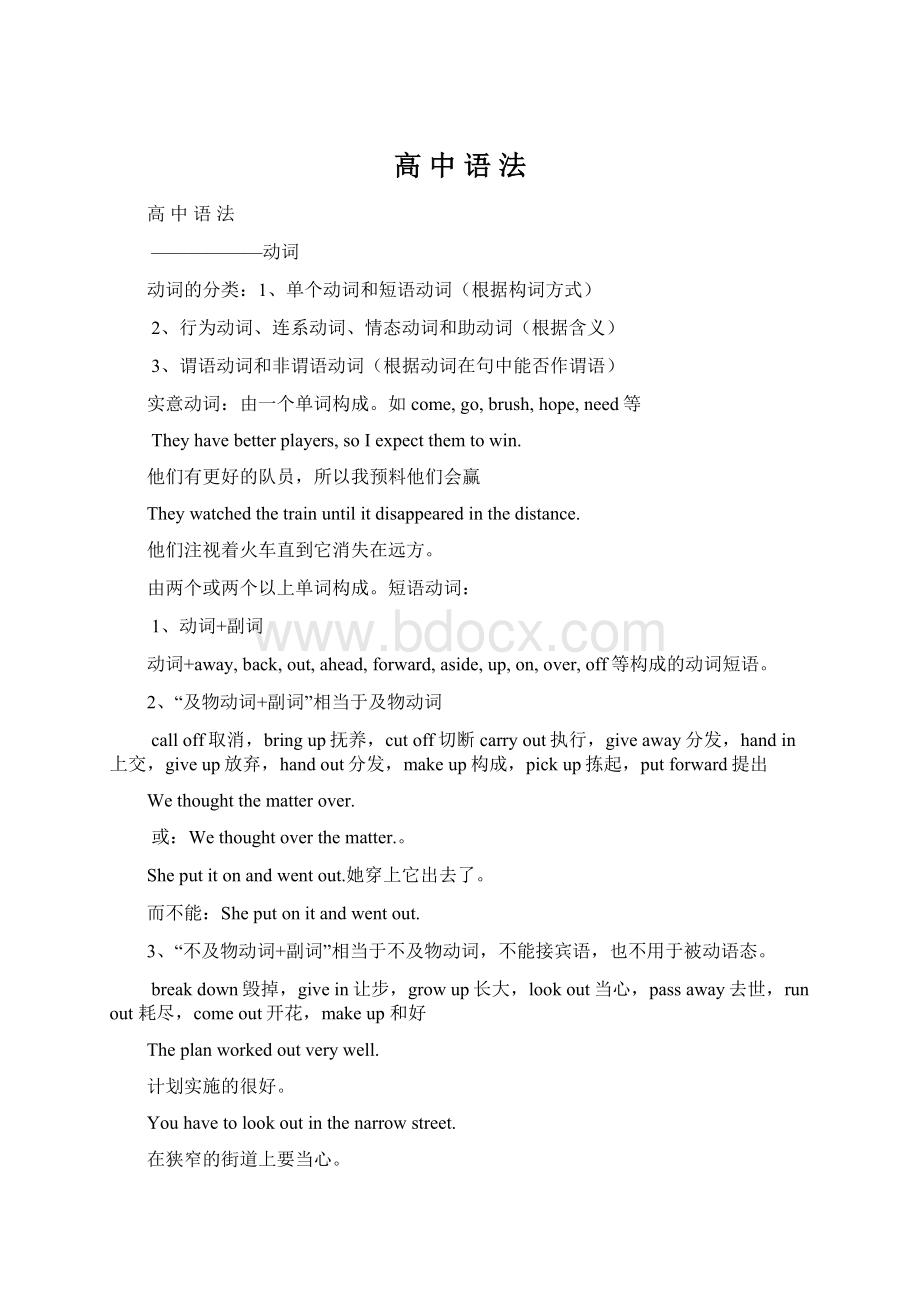高中语法.docx
《高中语法.docx》由会员分享,可在线阅读,更多相关《高中语法.docx(15页珍藏版)》请在冰豆网上搜索。

高中语法
高中语法
——————动词
动词的分类:
1、单个动词和短语动词(根据构词方式)
2、行为动词、连系动词、情态动词和助动词(根据含义)
3、谓语动词和非谓语动词(根据动词在句中能否作谓语)
实意动词:
由一个单词构成。
如come,go,brush,hope,need等
Theyhavebetterplayers,soIexpectthemtowin.
他们有更好的队员,所以我预料他们会赢
Theywatchedthetrainuntilitdisappearedinthedistance.
他们注视着火车直到它消失在远方。
由两个或两个以上单词构成。
短语动词:
1、动词+副词
动词+away,back,out,ahead,forward,aside,up,on,over,off等构成的动词短语。
2、“及物动词+副词”相当于及物动词
calloff取消,bringup抚养,cutoff切断carryout执行,giveaway分发,handin上交,giveup放弃,handout分发,makeup构成,pickup拣起,putforward提出
Wethoughtthematterover.
或:
Wethoughtoverthematter.。
Sheputitonandwentout.她穿上它出去了。
而不能:
Sheputonitandwentout.
3、“不及物动词+副词”相当于不及物动词,不能接宾语,也不用于被动语态。
breakdown毁掉,givein让步,growup长大,lookout当心,passaway去世,runout耗尽,comeout开花,makeup和好
Theplanworkedoutverywell.
计划实施的很好。
Youhavetolookoutinthenarrowstreet.
在狭窄的街道上要当心。
WearethinkingofgoingtoFrance.
我们正在考虑到法国去。
Theteachertoldustolookattheblackboard.
老师叫我们看黑板。
4、动词+副词+介词
相当于及物动词
catchupwith赶上,lookdownupon轻视,datebackto追溯到,lookupto尊敬,goonwith继续,putupwith忍受,lookforwardto期望,comeupwith提出
Ican'tputupwiththebadweather.
我不能忍受坏天气。
5、动词+名词(+介词)
相当于及物动词,大多可以构成被动语态
payattentionto注意,drawone’sattention吸引……注意力,getridof摆脱,keepaneyeon留意,makefunof取笑,makeuseof利用,takenoticeof注意到
Takecareofthepenceandthepoundswilltakecareofthemselves.节约便士,英镑自然会积累起来。
6、be+形容词+介词
besureof(about)确定,befondof喜欢,beusedto习惯
Heisfondofmusic.
Ihavebeenusedtothelifehere.
行为动词
有完整意义,能独立作谓语
①及物动词可以有宾语,可用于被动语态
②不及物动词
③动作动词
a.活动动词
表示各种活动,可用于进行时态,如:
do,play,ask,drink,rain
Thechildrenwereplayingwithaball.
b.过程动词
表示情况的改变,可用于进行时态,如turn,become,grow,change
Nothingwillchangehim.
注意:
非延续性动词不能同表示一段时间的状语连用。
④状态动词
表示静止状态,不用于进行时态。
但这些动词转义成为动态动词时可以用进行时态
a.感官动词see,feel,hear,taste,smell等
Iseeapictureonthewall.
b.心理、情感、状态动词
believe,consider,desire,dislike,doubt,forget,remember,understand,want,wish,regret,feel(=think)等,不用进行时。
IregrettosayIcannotcome.很抱歉,我不能来了。
c.拥有、关系动词
belongto,consistof,contain,include,need,owe,own,remain,require,have,exist,dependon,benefitfrom等,不用于进行时
Thatbookbelongstome.
①连系动词有三种词汇意义
a.表示某种持续的状态
常用词:
rest,stand,lie,continue,keep,stay,burn等
Keepquiet,please!
b.表示具有某种性质、特征和处于某种状态
常用词:
smell,live,sound,feel,seem,appear,taste,awake,remain
Themanseemedill.
c.表示动词的动作和过程所产生的结果或状态。
常用动词:
go,grow,prove,become,come,turnout
Hiswisheshavecometrue.
②系动词的五种语法结构
a.系动词+形容词
常用词:
sound,feel,smell,taste,turn,remain,keep,prove,grow,go,seem,look,come
Thisteatastessweet.
b.系动词+名词
常用词:
seem,prove,remain,become,turn,fall
Heturnedteacher.他当老师了。
(turn跟名词作表语,名词前不加冠词)
c.系动词+分词
常用词:
come,become,get,feel,look,prove,seem,grow,remain,get
Helookedworriedtoday.
④系动词+介词短语
常用词:
sound,appear,smell,keep,prove,remain
Themanappearedatease.
那个人看上去很安逸。
⑤系动词+副词
常用词:
keep,prove,continue
Theykepttogetherinthestruggle.
他们在战斗中紧密团结。
情态动词:
表示说话人对所说行为的看法,必须与其他动词一起构成谓语
助动词:
助动词本身没有意义,不能独立作谓语,必须与其他动词一起构成谓语。
表现于否定、疑问、强调以及时态、语态、语气等特征
非谓语动词
主谓一致
“主谓一致”是指谓语动词与主语必须在人称、数上保持一致,即主语是复数,谓语也用复数形式,如are,were,have等,主语是单数,谓语要用单数形式,如:
is,was,has,works等。
1.由and连接的并列成分但指的是同一概念或一个人的双重身份时谓语动词为单数,但由and连接的两个并列成分表示两个不同的概念时,谓语动词用复数。
TheworkerandwriterisfromBeijing.(那个工人兼作家…)
TheworkerandthewriterarefromBeijing.(那位工人和那位作家)
BothCathyandherdaughterLindahavegonefishinginCanada.
BreadandbutterisadailyfoodintheWest.
常见的由and连接的指一个概念的有:
theneedleandthread针线
saltandwater盐水
thefolkandknife刀叉
ironandsteel钢铁
timeandtide岁月
2.everyoneof、oneof、eachof、eitherof、neitherof+复数名词作主语,谓语用单数。
Eachofthestudentshasabook.
Eachofthegirlslikesdancing.
Oneofthemhasbeenabroad.
NeitherofthetwoboysisgoodatEnglish.
但"oneof+复数名词+定语从句"结构
如果one前面没有限定词,这个句型中的“复数名词”是先行词,定语从句的谓语动词用复数;
如果one前面有theonly,thefirst,thelast,theright等限定词修饰,则one是先行词,定语从句的谓语动词用单数。
Johnistheonlyoneofthestudentswhohasthekeys.
Johnisoneofthestudentswhohavethekeys.
3.morethanone/manya+单数名词作主语,意义上是复数,谓语动词常用单数。
(形单意复)
Morethanonestudenthastried.
Manyastudentandteacheriswatchingthefootballmatch.
Manyamanhasdiedinthewar.
4.each/every/no/manya+单数名词andeach/every/no/manya+单数名词作主语,谓语动词用单数。
1Eachbookandeachpaperisfoundinitsplace.
Everyboyandeverygirlhastherighttoreceiveeducation.
Manyaboyandmanyagirlhasseenthesepainting.
Everyhourandminuteisimportant.
第二个each,every,no,manya可以省略。
5.a+单数名词+andahalf,a+单数名词+ortwo作主语时,谓语动词用单数。
Ayearandahalfhaspassed.
Adayortwoisenough.
oneortwo+复数名词,
oneandahalf+复数名词作主语,谓语用复数。
Oneortwoboysknowit.
OneandahalfmonthshavepassedsinceIsawhim.
6.all,none,some,any等不定代词作主语,根据其指代的内容而定。
Allarepresent.
Allthefoodtastesgood.
noneof...结构作主语指代不可数名词作主语,谓语用单数;指代复数名词作主语,强调全体,谓语用复数更好一些;着重个别,则用单数较好。
Noneofthemoneyisyours.
Noneofushave/haseverbeenabroad.
7.“anumberof+复数名词”作主语,谓语用复数;“许多”
“thenumberof+复数名词”作主语,谓语用单数。
“…的数量”
Thenumberoftrafficaccidentshasincreased.
Anumberofchildrenlikethissong.
8.population做主语指人口,谓语用单数;指人的行为、居民等,谓语常用复数;分数/百分数+ofthepopulation做主语,谓语用复数。
Thepopulationofthevillageis538.
Onethirdofthepopulationhereareworkers.
9.theOlympicGames,theAsianGames做主语,谓语用复数。
TheOlympicGamesareheldeveryfouryears.
Two-thirdsofthepeoplepresentareagainsttheplan.
Three-fourthsofthesurfaceoftheearthiscoveredbysea.
Overtwentypercentofthecitywasdestroyedinthewar.
Forty-fivepercentofthedoctorswerewomen.
Only40percentofthestudentsintheclassareboys.
half、most、enough、part、therest、thelast、lots、some、plenty分数、百分数+of+名词做主语
谓语动词要和of之后的名词保持一致
10.集体名词class,family,army,team,club,population,party,crowd,majority,audience,government,public,group,等作主语。
强调整体用单数,指个体成员用复数。
HisfamilyisinHarbin.
Hisfamilyaremusiclovers.
Thecommitteewasmadeupof10members.
Thecommitteewereinthehall
但是并不是所有的集合名词都具有以上两种用法:
1.有的集合名词总是用作单数(不可数):
clothing衣服,poetry诗歌,baggage/luggage行李,furniture家俱,scenery景色等。
2.有的集合名词总是表示复数意义(但不用复数形式):
people人,police警察,cattle牲口等。
3.goods,clothes,glasses,shoes,scissors及trousers,chopsticks,等以复数形式出现的名词作主语,谓语用复数;
4.news,politics,maths,physics,plastics等形式为复数而意义为单数的名词作主语,谓语用单数。
ThegoodsbelongtoMr.Wang.
Nonewsisgoodnews.
Mytrousersarenew.
11.“the+adj./v-ed/v-ing”作主语the+dying,young,old,blind,rich,sick,wounded,poor及dead等词,相当于复数名词,代表整个类别,故作主语时谓语用复数。
TheoldinChinaarelivingahappylife.
Thewoundedhavebeensaved.
Thesickhavebeencuredandthelosthavebeenfound.
12.表示时间、距离、钱额、重量、空间、体积等意义的复数名词作主语,谓语动词常用单数。
Eighthoursofsleepisenough.
Ahundredmilesisalongdistance.
Tenpoundswasmissingfrommypocket.
Twentyyearshaspassedsincehelefthishometown.
13.由…or…,either…or,neither…nor,notonly…butalso…,not…but…等连接的并列主语,谓语动词常和靠近的作主语的名词在单复数上保持一致——就近原则。
NotonlyhebutalsoIaminvited.
Iorhisbrothersweretoblame.
NeitherInorheistoattendthemeeting.
Notonlythestudentsbutalsotheirteacherisenjoyingthefilm.
14.当therebe/herebe句型的主语是一系列事物时,谓语应与最邻近的主语保持一致。
1.Thereisapen,aknifeandseveralbooksonthedesk..
2.Therearetwentyboy-studentsandtwenty-threegirl-studentsintheclass.
3.Hereisaletterandabookforyou.
4.Therearethreechairs,twotablesandabikeinthehouse.
15.主语后跟“with,alongwith,togetherwith,like,unlike,besides,but,except,including,aswellas,asmuchas,ratherthan,morethan,nolessthan,andnot+名词”结构时,谓语动词一般和前面的主语保持一致。
1.Theteacherwithanumberofstudentsisintheclassroom.
2.Tom,asmuchasyou,wasresponsiblefortheloss.
3.Hemorethanyouisanxioustogothere.
非谓语动词
在句中充当除谓语以外的句子成分的动词形式叫做非谓语动词。
非谓语动词分为三种形式:
不定式、动名词和分词(分词包括现在分词和过去分词)
不定式
1、在句子中充当除谓语以外的句子成分的动词形式叫做非谓语动词。
非谓语动词分为三种形式:
不定式,动名词,和分词(分词包括现在分词和过去分词)。
1)不定式
时态\语态 主动 被动
一般式 todo tobedone
完成式 tohavedone tohavebeendone
2)动名词
时态\语态 主动 被动
一般式 doing beingdone
完成式 havingdone havingbeendone
3)分词
时态\语态 主动 被动
一般式 doing beingdone
完成式 havingdone havingbeendone
否定形式:
not+不定式, not+动名词, not+现在分词
1)谓语动词:
能在句子中作谓语,有人称和数的变化。
Iloveourcountry.
Heisateacher.
非谓语动词:
有不定式、动词-ing和动词-ed形式三种,在句子中不能单独作谓语,没有人称和数的变化。
一、不定式的作用
2、作主语不定式作主语时,谓语用单数。
往往用it作形式主语,把不定式放在谓语后面。
如:
Ittookustwohourstofinishthejob.
Itisimpossibleforustogetthereontime.
Itisverykindofyoutohelpus.
注意:
(1)其他系动词如look,appear等也可用于此句型。
(2)当不定式作主语的句子中又有一个不定式作表语时,不能用Itis…to…的句型。
试比较:
Itistonegatemyownideatobelievehim.(错)
Tobelievehimistonegatemyownidea.(对)
(3)Itis+adj.of/forsb.todosth.结构中,当不定式的逻辑主语和前面的形容词可以构成系表结构时,用of,否则用for.
3、作宾语
(1)动词+不定式。
如:
Hemanagedtoescapefromthefire.
Ifindithardtogetalongwithhim.(it作形式宾语)
注:
下列动词通常用不定式作宾语:
want,try,hope,wish,need,forget,know,promise,refuse,help,decide,begin,start,learn,agree,choose,get等
(2)动词+疑问词+to,“特殊疑问句+不定式”相当于名词,作宾语。
如:
Idon’tknowwhattodonext/howtodoitnext.
Ican’tdecidewhentogothere.
注意:
不定式短语作宾语时,如果还带有宾语补足语,往往把不定式短语放在宾语补足语之后,用it作形式宾语。
如:
Ifinditnecessarytolearnaforeignlanguage.
4、作宾语补足语
(1)动词+宾语+不定式(todo)。
如:
Hewarnedmetobecareful.
IwantyoutospeaktoTom.
Whatmakesyouthinkso?
(不带to的不定式)
注:
可以用动词不定式做宾补的动词有:
ask,tell,order,want,get,wouldlike,like,advise,invite,allow,help,wish,warn,expect,prefer,encourage
(2)表见解、看法的动词结构可为:
动词+宾语+tobe的不定式结构。
如:
Weconsider